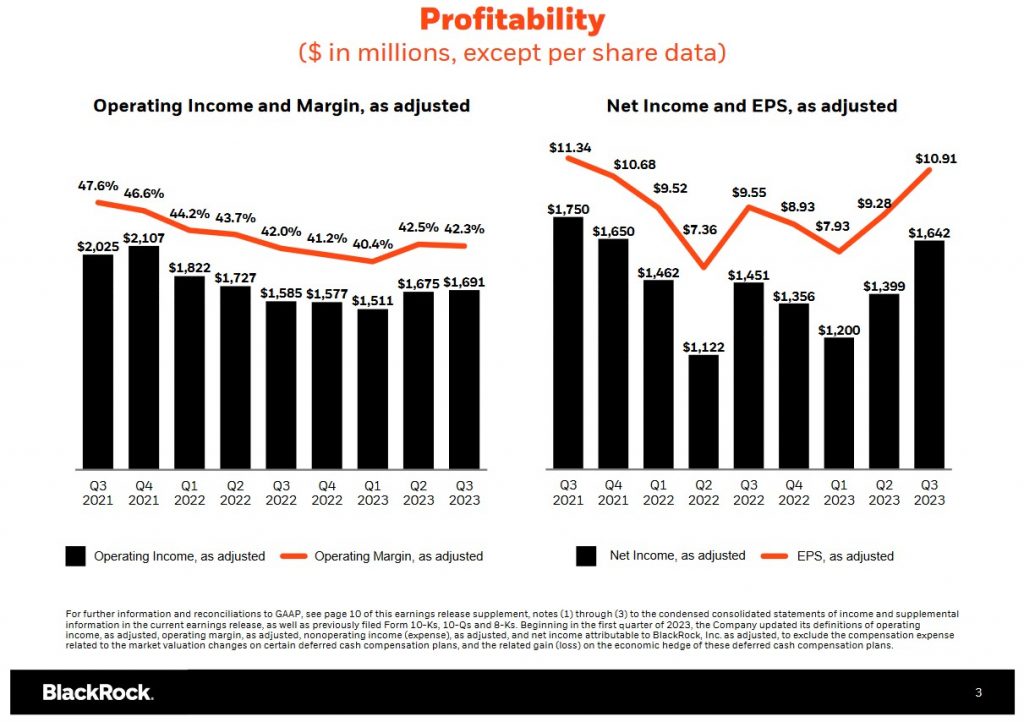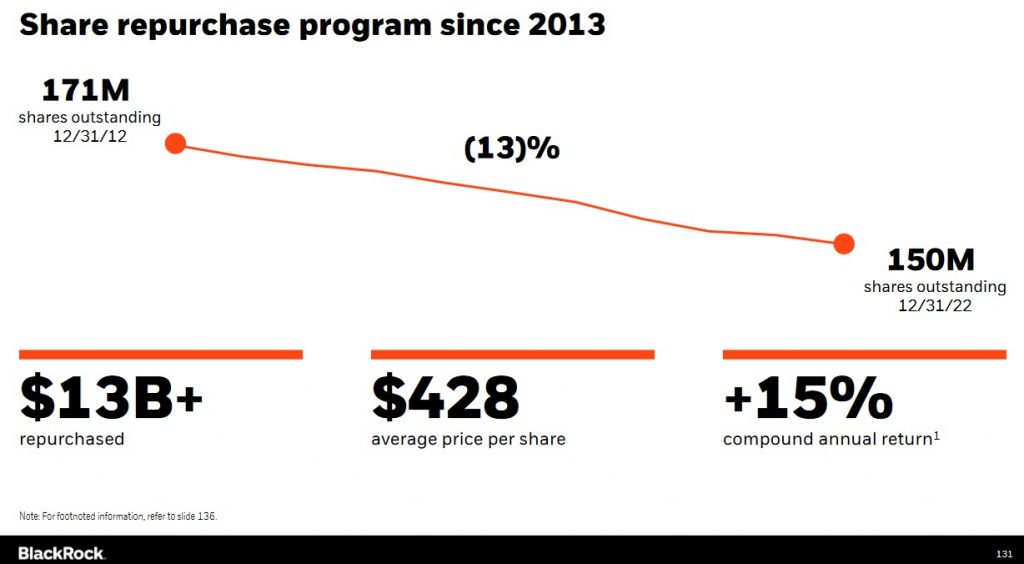Contents
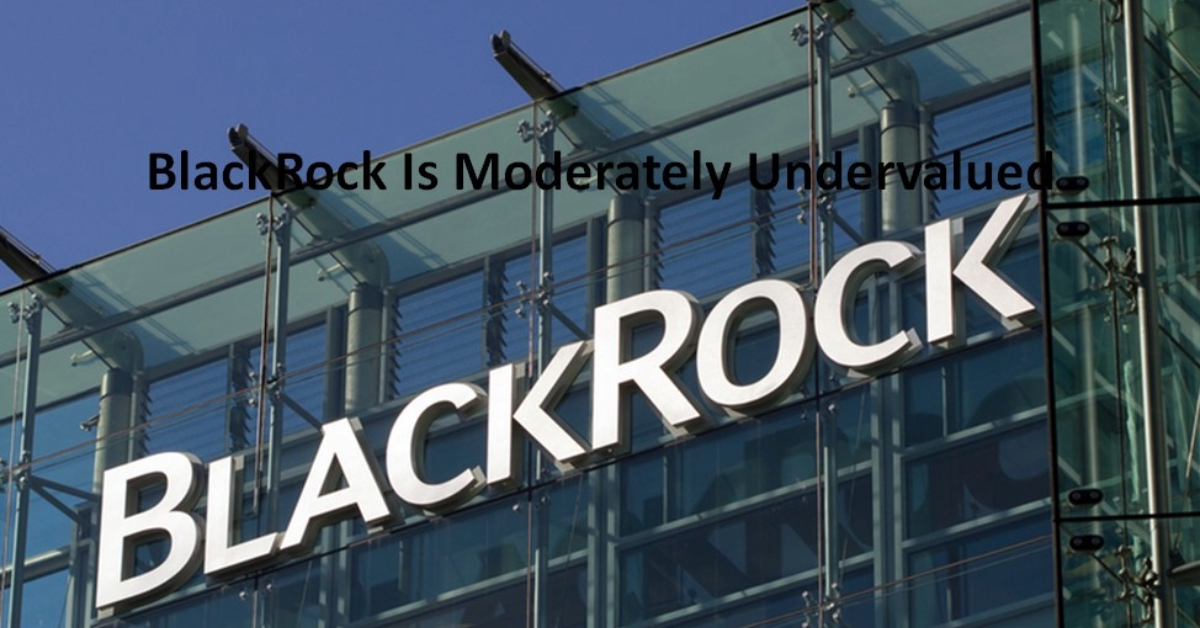
In my March 9, 2023 post, I disclosed a new position in BlackRock, Inc. (BLK) in a 'Core' account in the FFJ Portfolio with the purchase of 60 shares @ ~$664. I subsequently acquired:
- 40 shares on April 26 @ ~$656; and
- 30 shares @ ~$635 on May 9 (refer to my May 12 post)
bringing my total exposure to 130 shares.
I last reviewed BLK in my July 20 guest post at Dividend Power at which time shares were trading at ~$728. In that post, I stated I would not be adding to my exposure until such time as BLK's valuation became more attractive.
With the October 13 release of BLK's Q3 and YTD2023 results, I revisit this holding to determine whether its valuation is sufficiently attractive to recommend purchasing shares.
Overview
In July 2023, PwC released the findings of its '2023 Global Asset and Wealth Management Survey' in which it is estimated that 1 in 6 asset and wealth management companies globally are likely to disappear or be acquired by 2027; this is twice the normal turnover rate.
The survey of 250 asset managers and 250 institutional investors paints the picture of an industry grappling with a set of challenges:
- digital transformation;
- shifting investor expectations; and
- consolidation.
As a result, 73% of asset managers are considering a strategic consolidation with another asset manager in the coming months to:
- gain access to new segments;
- build market share; and
- mitigate risks.
Firms are also turning to technology to transform; more than 90% of asset managers already use disruptive technological tools (including big data, AI and blockchain) to enhance investment performance.
At its core, BLK is a passive investment asset manager. This should continue to enable it to minimize many of the secular headwinds facing traditional asset managers. In my opinion, BLK will benefit from this industry consolidation.
A comprehensive overview of BLK is provided in Part 1 Item 1 in BLK's FY2022 Form 10-K.
Acquisitions/Partnerships
BLK's M&A and partnerships focus on extending capabilities in technology in private markets, tapping into revenue pools of adjacent industries, and building scale.
The following are recent transactions which demonstrate its commitment to scale strategic growth initiatives or drive operational efficiency.
Kreos Capital Acquisition
On June 8, BLK announced a definitive agreement under which it would acquire full control of Kreos, a leading provider of growth and venture debt financing to companies in the technology and healthcare industries. This acquisition closed in Q3.
Jio BlackRock
On July 26, BLK and Jio Financial Services Limited (JFS) announced an agreement to form Jio BlackRock. This is a 50:50 joint venture that combines their respective strengths and trusted brands to deliver tech-enabled access to affordable, innovative investment solutions for millions of investors in India.
Upvest Partnership
On October 11, BLK announced that is partnering with Upvest to make investing more accessible for millions of investors across Europe. Upvest is a Berlin-based fintech company providing the trading, settlement and custody infrastructure necessary for digital wealth management in one application programming interface (API).
For first-time investors, the preferred way of investing is often through ETFs and specifically iShares. Through investment and innovation, BLK has evolved its iShares ETF franchise to meaningfully increase access to global markets. This includes access for tens of millions of new investors. It also includes access for BLK's most seasoned clients to use BLK's ETF technology to actively allocate across all types of markets.
Monzo Bank
Another example of a new growth opportunity is BLK's partnership and agreement announced in September in which BLK will be the asset manager partner of Monzo Bank Limited; Monzo, a British online bank based in London, England, is the U.K.'s leading digital bank.
BLK is launching a new investment offering for Monzo's 8 million customers.
Private Markets
Organizations are turning to the private markets with greater frequency for their capital and financing needs. This is leading to bigger and better investment opportunities for BLK.
In Q3, BLK announced that it is partnering with the New Zealand government to launch a $1B+ climate infrastructure strategy. BlackRock's Decarbonization Partners joint venture also reached $1B in committed capital for its first round and it has now invested in 5 portfolio companies.
It is also scaling successor funds in private markets, delivering larger funds through raises of subsequent fund vintages. For example, BLK is on the 10th vintage of its flagship U.S. private lending fund. In addition, it is in the market with a fourth vintage of its global diversified infrastructure equity fund series. Infra IV has already raised $4.5B in initial investor commitments at close, achieving over half its targeted size. In comparison, the third fund in the series raised a total of $5B in 2020, surpassing the total assets of vintages 1 and 2 combined.
Financials
Q3 and YTD2023 Results
An overview of BLK's Q3 and YTD results is found in this earnings release and earnings supplement. We see from this earnings release that BLK's average Assets Under Management (AUM) in Q3 2023 was ~$9.4T versus ~$8.48T in Q3 2022.
Momentum in the ETF business continued with $29B of net inflows in Q3. This was led by core equity and fixed-income ETF net inflows of $34B and $12B, respectively. However, BLK is not immune to an overall slowing of investor activity as overall ETF flows were impacted by redemptions concentrated in certain market-driven precision and fixed-income products.
Rate hikes over the last 18 months mean that for the first time in nearly 20 years, clients can earn a real return in cash. The result is that in the short term, investors have been able to generate positive returns while waiting for inflation to cool and for more policy certainty from central bankers. While this has negatively impacted industry flows, it is consistent with prior periods of policy uncertainty (eg. 2013, 2016 and 2018).
Total net inflows in Q3 were $3B. This includes $49B of lower-fee institutional index equity redemptions driven by client-specific index allocation changes; institutional index equity represents less than 3% of BLK's total base fees. Furthermore, these lower fee strategies are often only a portion of a client's overall relationships with BLK. For example, Q3 results include a $19B redemption from a single client. BLK, however, is working with this client to extend its mandates and active strategies.
Q3 revenue of $4.522B was 5% higher YoY. This increase was driven by organic growth, the impact of market and foreign exchange movements over the last 12 months on average AUM, and higher technology services revenue.
Operating income of $1.7B was up 7% YoY.
Adjusted diluted EPS of $10.91 increased ~14.24% YoY ($9.55 in Q3 2022). This increase includes:
- $0.127B of net investment gains, driven primarily by noncash mark-to-market gains in the value of our private equity co-investment portfolio; and
- a lower effective tax rate of ~12% which reflects $0.215B of discrete tax benefits associated with the resolution of certain outstanding tax matters.
Management, however, estimates that 25% is a reasonable projected tax run rate for the remainder of FY2023. The actual effective tax rate, however, may differ because of nonrecurring or discrete items or potential changes in tax legislation.
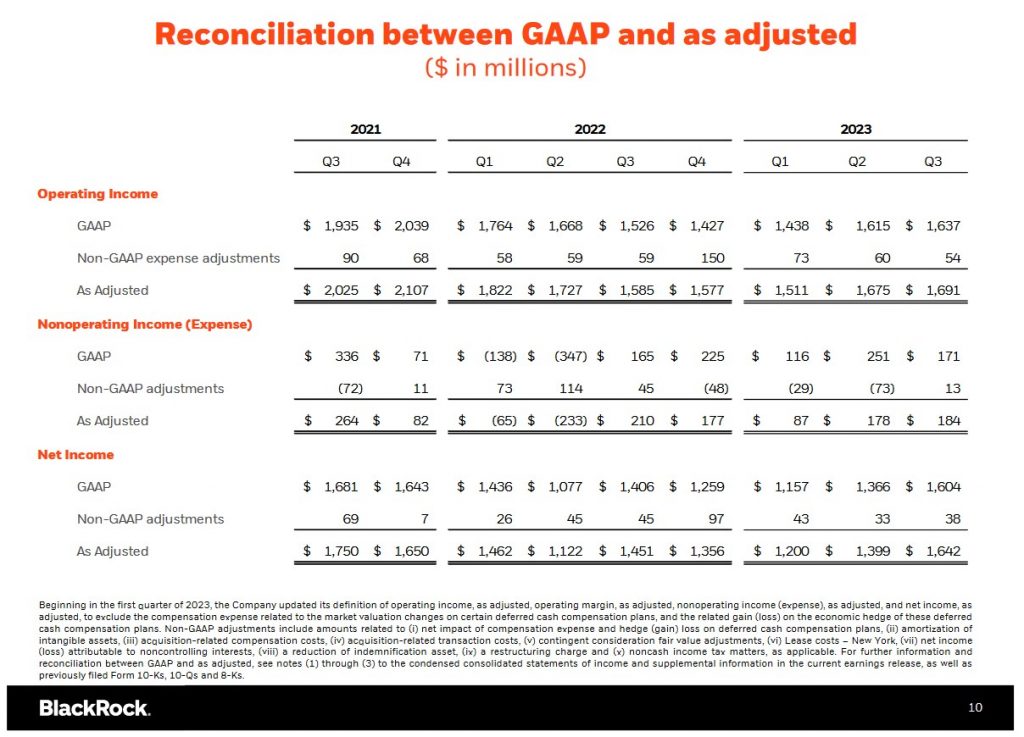
Source: BLK - Q3 2023 Earnings Release Supplement
Operating Cash Flow (OCF) Free Cash Flow (FCF)
In FY2017 - FY2022, BLK generated OCF of (in $B) 3.950, 3.075, 2.884, 3.743, 4.944 and 4.956 and FCF of (in $B) 3.795, 2.871, 2.630, 3.549, 4.603, and 4.423.
In the first half of FY2023, BLK generated only $0.591B in OCF and $0.449B in FCF. Within the next couple of weeks, I expect BLK will issue its Q3 Form 10-Q at which time we can ascertain BLK's OCF and FCF for the first 9 months of FY2023.
FY2023 Guidance
Historically, Q4 has been BLK's strongest quarter of ETF flows where, on average, it experiences 35% of its annual ETF net inflows; BLK has typically been a large beneficiary of ETF industry seasonality related to year-end rebalancing and tax planning. Management, therefore, expects an acceleration in iShares ETF flows as the end of 2023 approaches.
Risk Assessment
BLK's Q3 2023 Balance Sheet is currently unavailable. The following, however, reflects BLK's long-term borrowings at the end of Q2 2023.

Source: BLK - Q2 2023 Form 10-Q
In May 2023, BLK issued $1.25B of 4.75% senior unsecured notes maturing on May 25, 2033. The net proceeds of these notes are being used for general corporate purposes, which may include the future repayment of all or a portion of the $1.0B 3.50% Notes due March 2024. Interest of ~$59 million/year is payable semi-annually on May 25 and November 25 of each year, commencing on November 25, 2023. The 2033 Notes may be redeemed at BLK's option, in whole or in part, at any time prior to February 25, 2033.
The following table, provided for comparison, reflects BLK's long-term borrowings at FYE2022.

Source: BLK - FY2022 Form 10-K
In June 2018, Moody's upgraded BLK's domestic senior unsecured credit rating to Aa3 from A1. This Aa3 rating has been in effect since this upgrade and Moody's assigns a stable outlook.
In May 2014, S&P Global upgraded BLK's domestic senior unsecured credit rating to AA- from A+. This AA- rating has been in effect since this upgrade and S&P Global assigns a stable outlook.
Both ratings are the bottom tier in the high-grade investment-grade category. These ratings define BLK as having a very strong capacity to meet its financial commitments. The ratings differ from the highest-rated obligors only to a small degree.
These investment-grade ratings are acceptable for my purposes.
The following reflects BLK's quarterly capital management allocation for the past 2 fiscal years.
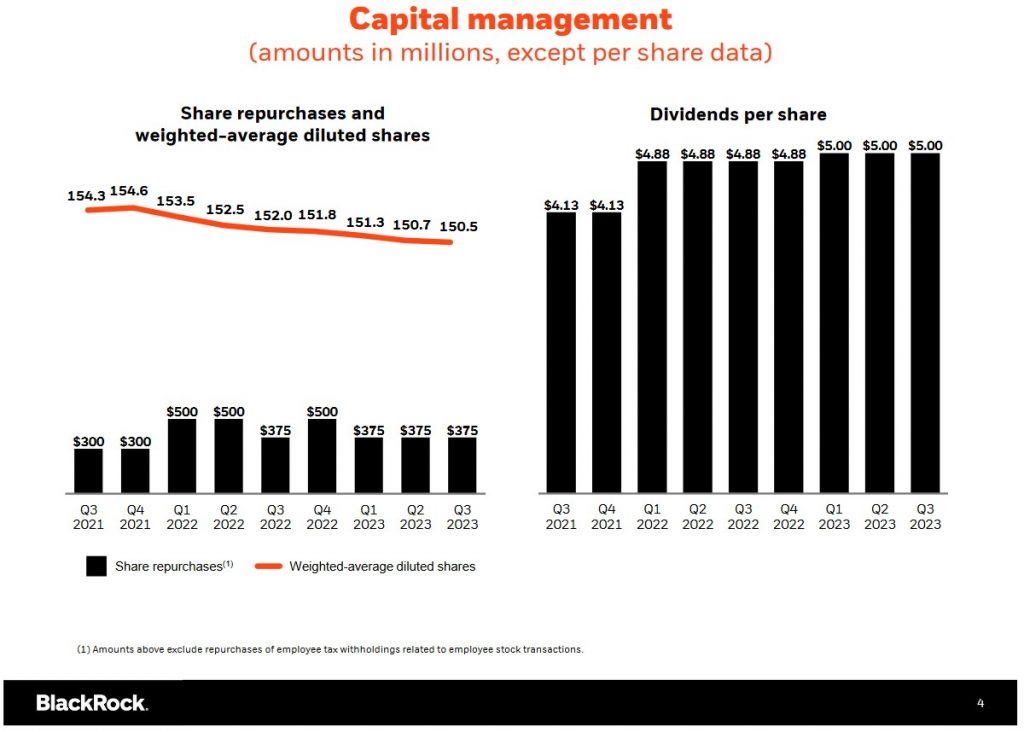
Dividend and Dividend Yield
BLK initiated a quarterly dividend in 2003 (see dividend history).
In early November we can expect BLK to declare its 4th consecutive quarterly $5/share dividend for distribution in late December. With shares having closed at $627.66 on October 13, the dividend yield is ~3.2%.
The dividend yield when I wrote my July 20 guest post was ~2.7% (~$728 share price) and ~3.07% when I initiated a position earlier in 2023.
BLK typically declares a dividend increase in mid-late January. If we conservatively estimate a 3% increase ($5 increasing to $5.15) in January 2024, the next 4 dividend payments will total $20.45 ($5 + ($5.15 x 3)). Using the current $627.66 share price, the forward dividend yield is ~3.26%.
BLK has significantly reduced its diluted weighted average common shares outstanding since 2013.
During FY2022, BLK repurchased 2.7 million common shares under its existing share repurchase program for ~$1.9B. On December 31, 2022, there were ~0.9 million shares still authorized to be repurchased under the program. In January 2023, BLK announced that its Board authorized the repurchase of an additional 7 million shares under the Company’s existing share repurchase program for a total of up to ~7.9 million shares of BLK common stock.
Based on capital spending plans for FY2023 and subject to market conditions, including the relative valuation of BLK's stock price, the target was to repurchase at least $1.5B of shares. BLK has repurchased $1.125B YTD (including $0.375B repurchased in Q3) and the plan is to repurchase $0.375B in Q4.
Valuation
BLK's FY2013 - FY2022 PE levels based on diluted EPS are 19.93, 18.57, 17.58, 20.08, 24.16, 11.30, 19.47, 24.07, 24.45, and 19.60.
When I initiated a position in BLK, the forward valuation based on currently available adjusted earnings estimates and a ~$651.28 share price was:
- FY2023 - 16 brokers - mean of $35.04 and low/high of $33.00 - $37.94. Using the mean estimate, the forward adjusted diluted PE is ~18.6.
- FY2024 - 16 brokers - mean of $39.90 and low/high of $36.15 - $42.23. Using the mean estimate, the forward adjusted diluted PE is ~16.3.
- FY2025 - 6 brokers - mean of $45.53 and low/high of $42.32 - $48.66. Using the mean estimate, the forward adjusted diluted PE is ~14.3.
When I wrote my July 20 guest post, BLK had generated $16.70 and $17.21 in diluted EPS and adjusted diluted EPS, respectively in the first half of FY2023.
BLK’s forward valuation based on currently available adjusted earnings estimates and the ~$728 share price was:
- FY2023 – 15 brokers – mean of $35.21 and low/high of $34.10 – $36.47. Using the mean estimate, the forward adjusted diluted PE is ~20.7.
- FY2024 – 15 brokers – mean of $40.49 and low/high of $37.30 – $45.19. Using the mean estimate, the forward adjusted diluted PE is ~17.8.
- FY2025 – 8 brokers – mean of $45.97 and low/high of $41.36 – $49.06. Using the mean estimate, the forward adjusted diluted PE is ~15.3.
I thought it was conceivable that BLK would double its YTD diluted EPS. Using $33.40 as BLK’s FY2023 diluted EPS and a ~$728 share price, the forward diluted PE for FY2023 was ~21.8.
BLK has now reported $10.66 and $10.91 in diluted and adjusted diluted EPS for Q3. In the first 3 quarters of FY2023, it generated $27.36 and $28.12 in diluted and adjusted diluted EPS. Using the current $627.66 share price and the currently available broker estimates to determine BLK forward adjusted diluted PE levels.
- FY2023 – 15 brokers – mean of $35.82 and low/high of $34.02 – $37.06. Using the mean estimate: ~17.5.
- FY2024 – 14 brokers – mean of $38.37 and low/high of $35.10 – $41.87. Using the mean estimate: ~16.4.
- FY2025 – 11 brokers – mean of $43.14 and low/high of $39.05 – $46.39. Using the mean estimate: ~14.5.
Final Thoughts
Rate hikes over the past 1.5 years are the fastest in the US since the early 1980s. This has made cash a safe place AND a very profitable place for investors; investors can earn 5% - 7% from conservative cash and bond portfolios. This dynamic reduces the near-term incentive to implement portfolio changes, resulting in temporarily slower client activity inflows. The degree to which investors have hunkered down in cash is shown by nearly $7T in money market funds AUM across the industry.
At some point, investors will put this money to work. A similar dynamic occurred as recently as 2016 and 2018 when policy uncertainty and the ability to earn yields on cash resulted in a temporary slowing in activity. What immediately followed those periods were new records for BLK client flows as well as 5+% organic base fee growth.
BLK's management expects that investors will begin redeploying assets once there is a conviction in a terminal rate and the shape of the yield curve thereby leading to strong results.
As noted at the outset of this post, the global asset and wealth management industry is likely to undergo significant consolidation. BLK, however, has been able to offset many of the secular headwinds facing traditional asset managers and appears to be well-positioned for an environment in which clients seek out providers of passive products and active asset managers that have:
- greater scale;
- established brands;
- solid long-term performance; and
- reasonable fees.
In my opinion, BlackRock is moderately undervalued. I recommend it if you wish to have long-term exposure to the asset management industry.
I wish you much success on your journey to financial freedom!
Note: Please send any feedback, corrections, or questions to [email protected].
Disclosure: I am long BLK.
Disclaimer: I do not know your circumstances and do not provide individualized advice or recommendations. I encourage you to make investment decisions by conducting your research and due diligence. Consult your financial advisor about your specific situation.


